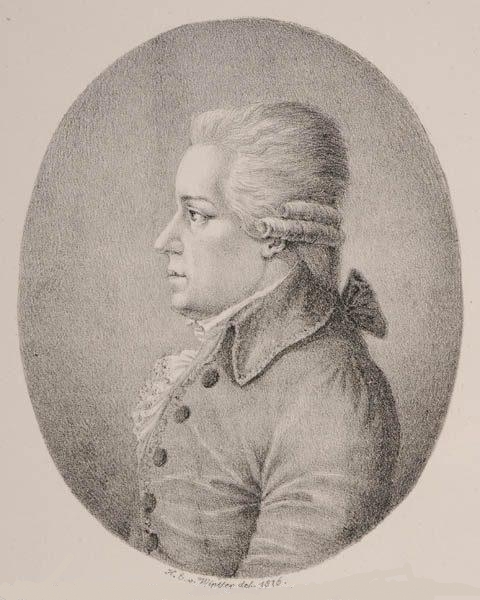<Back to Index>
- Astronomer Harlow Shapley, 1885
- Composer August Carl Ditters von Dittersdorf, 1739
- Dutch Revolutionary Joan Derk, Baron van der Capellen tot den Pol, 1741
PAGE SPONSOR

August Carl Ditters von Dittersdorf (2 November 1739 – 24 October 1799) was an Austrian composer, violinist and silvologist.
Carl Ditters von Dittersdorf was born in Laimgrube, Vienna, Austria, as August Carl Ditters. His father was a military tailor, serving in the Austrian Imperial Army of Charles VI, in a number of German speaking regiments. Having retired successfully from his martial obligations, he was provided with Royal Letters of Reference and a sinecure with the Imperial Theatre. In 1745, the six year old August Carl was introduced to the violin and his father's moderate financial position allowed him a good general education at a Jesuit school and private tuition in music, violin, French and religion. After having left his first teacher, August Carl studied violin with J. Ziegler, who, a few years later, and through his influence, made August Carl be appointed as a member of the orchestra at the Benedictine church on the Freyung. By 1750, August Carl had obtained a post with the Viennese Schottenkirche orchestra.
Prince Joseph Friedrich von Sachsen - Hildburghausen noticed him and on 1 March 1751 hired him for his court orchestra. At the princely demesne he studied violin with Francesco Trani who, impressed with the ability of his pupil in composition, commended him to Giuseppe Bonno who instructed August Carl in Fuxian counterpoint and free composition. After a few years the Sachsen - Hildburghausen closed the activity of his orchestra, since he had to leave Vienna to assume the regency in Hildburghausen, and August Carl was hired by the Empress for her own orchestra through Count Durazzo, Theatre Director at the Imperial Court. In 1761 August Carl was made violinist for the Imperial Theatre, and in 1762 orchestra conductor of the same institution. It was during this period that he became acquainted with Gluck. In 1763 he traveled to Bologna with Gluck, to attend the performance of the opera Trionfo di Clelia: this "Italian Tour" was to leave the greatest impression on his musical opus, impression received both by Gluck and by the Italian music treatment and practice. In 1764 he traveled to Paris but the documentation about this experience is scarce and uncertain. In 1764, August Carl was back in Vienna and made the acquaintance of Joseph Haydn, becoming one of his closest friends. Ditters' contract with Count Durazzo expired in the winter of 1764.
In 1764, Ditters assumed the post of Kapellmeister at the court of Ádám Patachich, Hungarian nobleman and Bishop of Nagyvárad (Oradea, Romania). The following year he was introduced to Philipp Gotthard von Schaffgotsch, the Prince - Bishop of Breslau, who wished to create a cultural center around his court at château Jánský vrch (Johannesberg) in Javorník, (today Czech Republic). In 1771 Ditters accepted the post of Hoffkomponist (court
composer), and it was during his tenure at Johannesberg that most of
his creative output was produced. Over the next twenty years, he
composed symphonies, chamber music, and opere buffe. In 1773 the prince - bishop made Ditters Amtshauptmann of nearby Jeseník (Freiwaldau),
one of several measures to help entice the cosmopolitan composer to
remain at isolated Johannesberg. Since this new post required a noble
title, Ditters was sent to Vienna and received a noble title von Dittersdorf. His surname became "Ditters von Dittersdorf", but he is usually referred to simply as "Dittersdorf".
Dittersdorf was the music teacher of Johann Baptist Vanhal. About 1785, Haydn, Dittersdorf, Mozart and Vanhal played string quartets together. Haydn and Dittersdorf played the violins; Mozart, the viola; and Vanhal, the cello. The recorder of this event, the composer and tenor Michael Kelly, stated that they played well but not outstanding together, but the image of four of the great composers of the time all joined in common music making is still one of the classic images of the Classical era.
In 1794, after twenty - four years at Johannesberg, von Dittersdorf experienced a serious clash with von Schaffgotsch and was expelled from the palace. The next year he was invited by Baron Ignaz von Stillfried to live at his spare castle Červená Lhota in southern Bohemia. His final decade was occupied with overseeing operatic productions and with compiling and editing his own music for publication.
He died at the estate Nový Dvůr (Neuhof) at château Červená Lhota, Southern Bohemia. His grave lies in the town of Deštná. Three days before he died, he finished writing his autobiography.
Ditters' early work was a prefiguration of his serious output that was to come in later years — an almost Italianate style focused on melodic development without the overt flourishes characteristic of le style français.
He was an important composer of the Classical era. After some early Italian opera buffa, he composed a number of German Singspiele, with Der Apotheker und der Doktor (1786, generally known today as Doktor und Apotheker) in particular being a tremendous success in his lifetime, playing in houses all over Europe. His symphonies (around 120 of them) include twelve based on Ovid's Metamorphoses (six of which have survived to the present day). He also wrote oratorios, cantatas, concertos (including two for the double bass and one for the viola), chamber music, piano pieces and other works. His memoirs, Lebenbeschreibung, were published in Leipzig in 1801. His works, such as the double bass concerto, were published in Leipzig by the Friedrich Hofmeister Musikverlag.